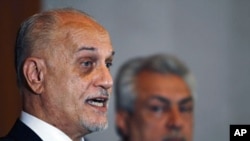A dispute between the Iraqi central government and the Kurdish autonomous region is gaining momentum after Kurdistan halted oil exports to Baghdad.
Iraq's Kurdish regional government has stopped exporting oil to the central government in Baghdad, drawing a sharp rebuke from officials in the capital.
The Kurdish Regional Government reached an accord with Baghdad in 2011 that it would export its oil to the central government, which would sell it and return half of the revenues.
The Kurdish region's Ministry of Natural Resources said Sunday that Baghdad had not made any payments to Kurdistan since May 2011. A ministry statement said that Kurdistan has “reluctantly decided to halt oil exports until further notice,” due to the lack of payment. The region has been shipping about 50,000 barrels a day to Baghdad.
Iraq's Finance Minister Rafaa al-Issawi said last week that Baghdad approved the payment of $560 million to Kurdistan, but he said a final audit is pending.
Iraq's Shi'ite Deputy Prime Minister Hussain al-Shahristani said Monday that Kurdistan has not been sending all its oil output to the central government.
He said large quantities of oil are being smuggled into Iran [and Turkey] and that Iraq is urging both countries to monitor their borders to prevent such smuggling. Iraqi oil, he insisted, must only be sold through two legal pipelines [via Basra and the Turkish port of Ceyhan.]
Shahristani said the Kurdish actions will cause an Iraqi central-government budget deficit.
He said Iraq already lost more than $3.5 billion in 2011 from oil that was produced in Kurdistan, but not delivered to Iraq's oil export company.
The oil dispute has added to tensions that have been mounting between Kurdistan and the central government since Iraq's Sunni Vice President Tareq al-Hashemi sought refuge in the Kurdish region, last December. Iraqi Prime Minister Nouri al-Maliki had tried to arrest Mr. Hashemi for alleged acts of terrorism.
Shahristani told journalists that Qatar, where Hashemi has been meeting with Qatari officials, must hand him over to Iraq.
He said that Vice President Hashemi should be forced to testify [before the Iraqi judicial system] and defend himself if he is innocent, rather than hiding.
Kurdistan has also been at odds with Baghdad over an oil exploration deal signed last November with Exxon Mobil.
Despite the problems with the Kurdish region, Iraq is reporting its highest oil exports since 1989, selling 2.13 million barrels a day in March.
News
Iraq's Kurdistan Region Halts Oil Exports to Baghdad
